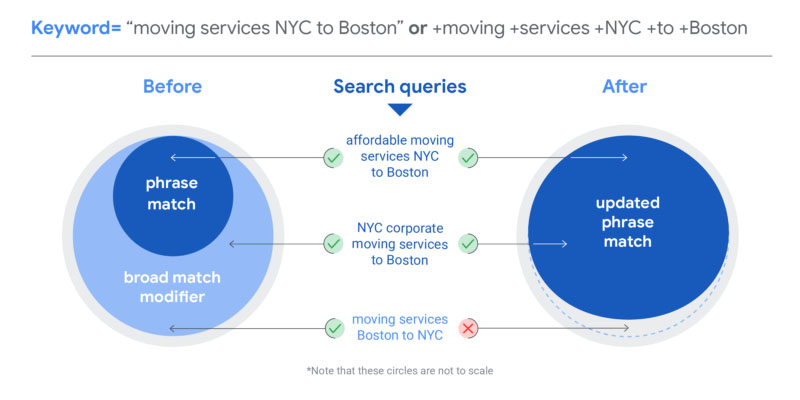Google Ads Match Type Update Forces Advertisers to Adjust
On February 4, 2021, Google announced an immediate update to its Ad platform, overhauling how companies bid for keywords and connect to their target audiences. Wasting no time, Google began implementing changes on February 18. Advertisers who haven’t already started adapting will no longer be able to bid on broad match modifier type starting in July 2021. We share below steps we have taken to maximize the performance and spend on client PPC budgets based on Google’s recent changes.
What did Google change exactly, and how must advertisers evolve to ensure their campaigns drive meaningful traffic?
The “Old” Google Ad Match Types:
Let’s start with a clear picture of what was: Up until recently, Google offered four different bidding options for brands and agencies to reach their target customers. These options gave advertisers reasonable control over when their ad would show up in search results.
[table id=3 /]
According to Google, four match types were excessive.What did Google change, and why?
“We’ve seen that phrase match and broad match modifier often serve the same use cases and that you can reach more of the right customers through a combination of the two.”
As a result, they cut the list down to three match types.
Then there were three…
- Exact match
- Broad match
- Phrase match (which incorporates elements of Broad Match)
As of February 18, Broad Match Modifier (BMM) is out, and Phrase Match (PM) will now include some of BMM’s traffic. Before the change, Phrase Match campaigns only qualified ads to run when the search term matched the phrase’s exact order. But Google’s example below shows Phrase Match will now expand to cover BMM-like searches that don’t necessarily include the same phrase but rather related searches.
Additionally, BMM campaigns used to qualify ads to run even when someone searched for the reverse order query. For example, if an advertiser bid on “moving services NYC to Boston,” their ad might appear in front of someone who searched for “moving services Boston to NYC.” According to Google, the updated Phrase Match will not function that way.
 Source: Google
Source: Google
The Impact on Brands and Advertisers
Google claims its Ad updates will “simplify keywords and make it easier to reach relevant customers.” But the Simply180 jury is out. It’s difficult to say how this will affect the advertiser’s ability to drive traffic to their websites successfully. On the one hand, it’s great that the new Phrase Match prevents ads from appearing in potentially irrelevant reverse keyword searches. On the other hand, advertisers are losing a critical component of control.
Under the new system, advertisers who bid on Phrases Match keywords won’t have authority over the order of the words anymore. As a result, their ads may reach more people. But they may not appear in front of the most relevant people, translating to more impressions with a reduced click-through rate.
For example, A luxury limousine provider used to be able to control its audience’s quality by targeting the phase “premium taxi services” in that order. Today, advertisers must rely on Google’s new Phrase Match algorithm to determine who sees the ad. For example, with the new Phrase Match, Google may show the ad to people who search for “premium but affordable taxi services.” Similar idea, but not the same meaning.
Alternatively, brands that currently drive more traffic from Broad Match Modified keywords may see a decrease in impressions, clicks, and conversions. Why? The new rules may inhibit some of their keywords from matching to searches because word order matters now. Additionally, BMM advertisers will now have to rely on searches that include every keyword, further reducing their reach.
What PPC Advertisers Can Do Now
In its announcement, Google tells advertisers they don’t have to “take any specific action” to update their Phrase Match or BMM keywords because it will automatically apply the new behavior rules to both match types. But that advice is oversimplified. With Google tacitly gaining more power over where and when to show ads, advertisers must start making changes now to be sure their PPC campaigns continue to perform.
They’ll need to start bidding on more negative keywords to prevent showing ads to irrelevant audiences while ensuring they don’t fall down the slippery slope of spending too much money. Advertisers must double efforts to ensure they’re working within a cost-effective budget while still achieving their goals.
Companies must conduct regular heat map checks to learn from landing page behavior, analyze traffic volume changes, track current BMM campaigns’ performance, and consistently revise their bidding strategy to align with the new findings. They must start getting ready for July 2021, when Google will no longer allow advertisers to create new BMM keywords. Starting today, advertisers must reinvent their existing BMM campaigns and develop keywords in Phrase Match only. But they must do it in a drip-like fashion. If companies change everything all at once, they risk losing significant traffic. Ah, the conundrum.
Companies who manage ad spending and strategy in-house will have to consider bringing in a second set of eyes to ensure they’re on the right path. Now more than ever, brands must partner with advertising and marketing agencies to help them adapt.
————–
The road to driving meaningful traffic is now longer and harder than ever. But agencies like Simply180 are used to it. Google has altered its keyword match type rules five times since 2014. And every time, Simply180 has rapidly adjusted because living in Google’s past is not an option. Google never lets companies rest in their comfort zones for long. It thrives in constant flux, and only agencies that quickly move on will help their clients succeed. By now, companies still thinking about the good ole’ Broad Match Modifier and Phrase Match days are far behind the eight-ball.
